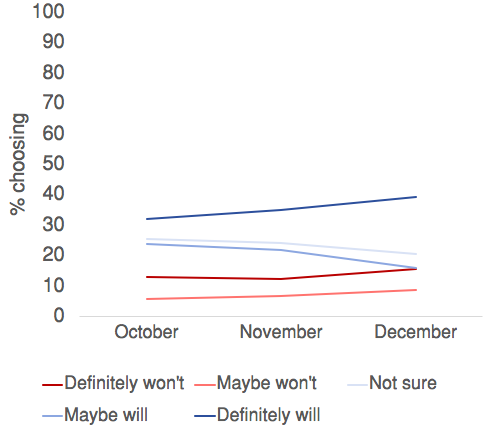What do Rhode Islanders think about COVID-19 testing, prevention, and vaccination?
Project Summary
In collaboration with Rhode Island's Department of Health and Governor's Office, we conducted a series of surveys to understand the beliefs and attitudes governing individual behaviors during the COVID-19 pandemic to help policymakers respond effectively in these unprecedented times.
Why is this issue important?
The COVID-19 pandemic is a public health emergency without recent precedent. Given that an effective public health response requires citizen participation, policymakers need to understand the beliefs and attitudes that govern individual behaviors under these novel circumstances.
What did we do?
The Policy Lab, working closely with the Rhode Island Department of Health and the Office of the Governor, conducted a series of statewide and national surveys to fill this need. The initial research was focused on attitudes towards COVID-19 testing, a key component of public health surveillance. However, the multi-wave format allowed us to respond to state priorities as they changed over time, examining (for instance) why young adults were experiencing the highest case rates in the state or why Rhode Islanders might or might not be willing to get vaccinated.
What did we learn?
We found that a majority of Rhode Islanders were either “probably” or “absolutely” willing to get tested, although the share who said “absolutely” dropped from 53% in September to 39% in December, similar to the drop we saw in U.S. responses.1 A quarter to a third of respondents in all samples were uncertain about the accuracy or confidentiality of testing. A small but persistent minority either “agree” or “strongly agree” that the seriousness of the virus has been overstated (16-23%) or bad things might happen if they get tested (11-15%).

We also found that the percentage of Rhode Islanders who “definitely will” get vaccinated increased from 32% to 39% from October to December. Still, the proportion who said they either “definitely” or “maybe” will get vaccinated hovered around 56%, below both US trends from these periods2 and estimates of the number vaccinated necessary to achieve herd immunity.3
Rhode Islanders were more concerned with side effects than any other downside to vaccination, and increasingly so. Some 43% responded “agree” or “strongly agree” that vaccines pose this risk in November, with the percentage rising to 50% in December. This is consistent with many national findings.4 Another third in both samples was unsure of the risks of side effects.

The October survey focused on young adults (18-29), who continually showed higher infection rates than other age groups, found that just 17% of this group self-reported wearing masks “every time” they visited friends and family—at least 13 percentage points lower than all other groups except 30-39-year-olds (20%)—even though they reported wearing masks when entering businesses or leaving the home at higher rates than all other groups. Although self-reports are notoriously biased, presumably young adults felt little pressure to under-report compliance with public health guidelines, so inconsistent mask-wearing while socializing is likely widespread. (Notably, mask-wearing when visiting friends and family was lower than when entering businesses or leaving the house for all age groups, but the pattern was most pronounced for 18-29-year-olds.) Young adults also socialized with more people and practiced social distancing less than all other age groups. Just half correctly identified their own age group as the most likely to be infected, suggesting many underestimate risk.
What happens next?
A full examination of vaccine intentions and beliefs by demographics and other individual characteristics is forthcoming; preliminary results indicate that intentions to vaccinate are lower in Rhode Island’s major cities, among Republicans, and at lower ranges of family income or educational attainment. Results from a survey experiment and our ongoing COVID-19 behavioral research tracking6 suggest that public health messages appealing to the good of the community are less effective than identical messages that appeal to the good of one’s family. This result informed the state’s COVID-19 messaging strategy, which Governor Raimondo summarized during a subsequent weekly press briefing: “I have been up here offering a message of ‘protect your household’, I’m gonna continue to hammer home that message.”7
The Policy Lab continues to work with RIDOH on surveying COVID-19-related beliefs and behaviors in order to inform the state’s ongoing mitigation efforts and vaccine rollout.
-
Here we show only representative samples of Rhode Islanders, so some percentages differ from those in the reports, which included oversamples of young adults.
↩ -
E.g., Understanding Coronavirus in America (USC Dornsife)
↩ -
Anderson et al., 2020; McNeil, 2020; Royal Society/British Academy, 2020
↩ -
Hamel et al., 2020; Kreps et al., 2020; Tyson et al., 2020
↩ -
https://tpl.fyi/covid-research-tracker
↩ -
See here, particularly at 23:45.
↩
How to cite this Project: The Policy Lab. (2021, February 21). What do Rhode Islanders think about COVID-19 testing, prevention, and vaccination?. The Policy Lab. https://thepolicylab.brown.edu/projects/rhode-island-covid-surveys

